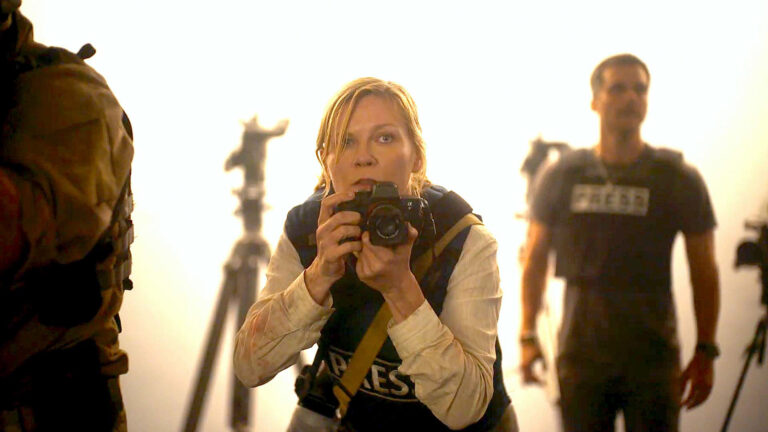
Civil War: a group of reporters and photographers travels through America in order to reach Washington D.C. and try to interview the President of the United States during a civil war.
Rating: R
Genre: Dystopian, War, Drama
Original Language: English
Director: Alex Garland
Producer: Gregory Goodman, Andrew Macdonald, Allon reich
Writer: Alex Garland
Release Date (Theaters): April 12th
Runtime: 1h 49m
Distributor: A24
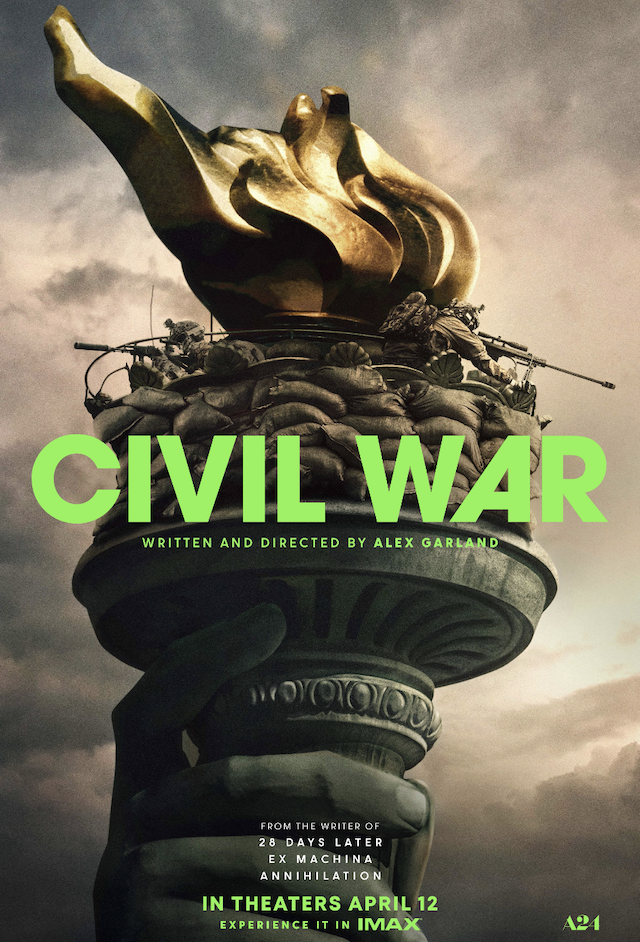
Q&A with Actors Kirsten Dunst, Cailee Spaeny, Wagner Moura and Director Alex Garland
Q : Can you elaborate on your attraction to this type of dystopian storytelling?
Alex Garland -I’m going to be a bit nerdy. It’s about the word dystopia. It’s sort of like the flip of utopia, and utopia doesn’t exist. That’s the point about utopia, they don’t exist. That sort of implies dystopia don’t exist, but they really, really do. So I don’t want to fictionalize it too much. Obviously this is fiction, but underneath it, inside it, is something real.
Q : Can you explain how you came up with this story and why it was the appropriate time to tell it?
Alex Garland – I wrote this movie four years ago, and I think if you cast your mind back, it was very much like it is right now, everything was exactly the same. It may have been less bad than it is now in some respects. At the point, there was a lot of anxiety around. Lots of people were concerned about division, polarization, populist politics that lead to extremism and therefore something authoritarian in the way that’s shown here as an extension. There was something strange about the press and journalists. There was a lot of talk about all this subject matter.
There was a lot of talk about the press writing very good stories. They were analytical and thoughtful and balanced and all sorts of things, but they had no traction. They didn’t seem to stop anything from happening. I spent a lot of time wondering if Woodward, Bernstein and the Washington Post had been investigating Nixon now or four years ago, which would be the same as now. Would that story have led to him and his government ending? I’m not sure it would. That’s very strange. So I started thinking about an older form of journalism, which is reporting. What lies behind that?
Q : Kirsten, I would love to bring you in your character. Lee is so fascinating. She is obviously this legendary photojournalist, but also a hardened person because of everything that she has witnessed and survived. What was your process as an actor to tap into the headspace of someone like that and getting to understand her life and her way of thinking?
Kirsten Dunst – As soon as I got the role, I got very excited. I started training to use different camera lenses, because obviously it had to look like it was part of me, something that was very easy. We watched some films and documentaries that Alex showed us, a Marie Colvin documentary called Under The Wire was what spoke the most to me. That really made sense for all of us, and how we worked together. We watched it together as a cast.
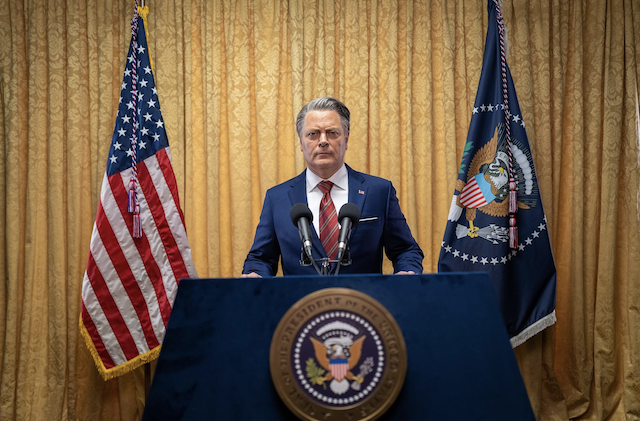
Q : Cailee, what was your first reaction when you read the script and how did you sort of engage with Jessie’s drive and ambition to become a photojournalist?
Cailee Spaeny – Alex is a writer first, I think his scripts are just a fantastic read, everything you see on the screen is right there on the page a lot of the time, including the heart of these characters, the nuances and the relationships. You just try to start putting the puzzle piece together one by one. I began with conversations with Alex and then tried to make the connections between me and Jessie, really understanding that drive, where that comes from with her.
Q : Wagner, you have a background in journalism. Did engaging with your character become advantageous for you?
Wagner Moura – It did. I graduated as a journalist. I worked as a journalist for a while. I love the fact that this is a film about journalism. Like Alex said, we need journalism. I talk to my friends sometimes. Most of my friends are journalists and they’re like: ‘This is getting worse. The newspapers are closing down. I’m starting to look for another thing to do.” And I find that very scary, because journalism is a pillar of a democracy.
It freaks me out to see people getting information from social media ,which only increases polarization, which is what this film is also about. But war journalism is another completely different thing, so I reached out to some of these people and I wanted to know from them especially how they did their job, how they felt in the war zone. What was the feeling of being a civilian in a war zone? I read a lot. I read some books about it, too, and reached out to some people. But, yeah, the background kind of helped, too.
Q : Can you talk about the choreography of the action scenes? How did you kind of design them?
Alex Garland – Years ago I went to see Ang Lee and James Schamus who are the screenwriter and director for Crouching Tiger, Hidden Dragon, and there was a similar question from the audience. Schamus said: “I write, they fight”. I completely understood what he meant. I write, they fight. There’s obviously slightly more than that, but not that much more.
There’s a large team of people who come in and think about how to execute that. And there’s big meetings with lots of departments. I, as a director, I tend not to shortlist or storyboard. What I do on big sequences is something a bit like football plays. So there’ll be a big map with circles and arrows and triangles and stuff like that. It’s actually a very good way for everybody to understand choreography.
The people I really want to mention and defer to are Jeff Dashnaw, a stunt coordinator, and um, Ray Mendoza, who is the military advisor. There was a tone that we needed to hit, which was to do with grammar in some way. Avoiding certain kinds of movie grammar and reaching more the grammar of documentaries, like news footage or lived experience. Then with Rob Hardy, the cinematographer, we would discuss how to shoot it, and it sort of builds up from there in a very collegiate way.
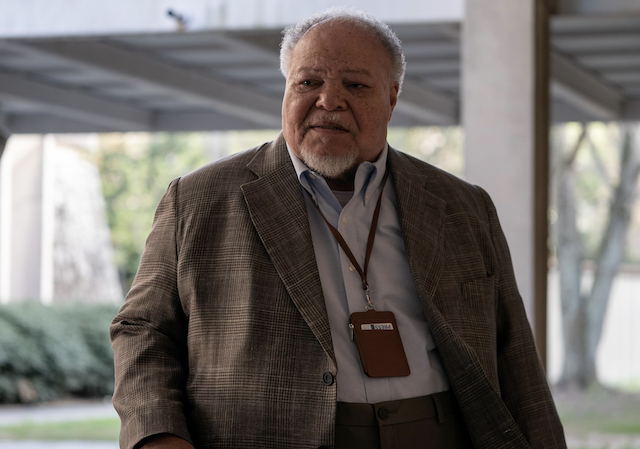
Q: There’s sometimes a fine line in cinema, maybe even journalism about what to show, how much to show, if you’re kind of unintentionally glorifying something…
Alex Garland – We were very concerned with it. There are things about cinema which pull the viewer very hard always towards something romantic, whether it’s a thriller or a war film. It just drags you in that direction. That’s what I wanted to avoid.
Q : How was it to be in the middle of these really intense action sequences? How did you prepare for them physically and also maybe even emotionally?
Kirsten Dunst – Well, we shot the film in order, that gave us a gradual transition. Building in terms of the scenes and what was coming next, and still the last two weeks specifically for me were very intense just because the noise was as loud as the audience can hear it. We didn’t use half rounds or quarter round flanks that you usually use in a film. We used full rounds and it’s very loud, very intense, that stuff gets in your body.
Wagner Moura – You go home and you’re fine.You see your kids, but still this war is in your head. These things stay in your body. You’re giving information to your body, and the body doesn’t know it’s not true. You can’t process it. Take a shower, eat something, go to bed. And do it again. Your mind is someplace else, but the body is still feeling that thing. You grab a cup and your hand is shaking. It takes time to shake it off. It was very immersive, the way we did it and the way it was shot, it felt as real as possible, which I think reflects in the film.
Q : You also spent a lot of time together in the car. Which probably led to building a sense of camaraderie…
Cailee Spaeny – You sort of watch that play out in real time. Especially for my character, because I’m meeting everyone. Our relationship definitely grew as we were filming and thank God we all liked each other because we’re in that car about 70 percent of the time.
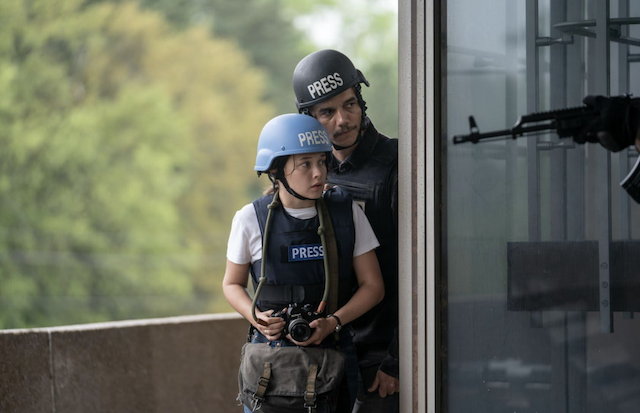
Q: Do you use those analog cameras in your daily lives? How did you become comfortable with them?
Kirsten Dunst – I actually used a digital camera, but we decided that I’d pull my focus so it was more cinematically interesting instead of just automatic, you know what I mean?
Cailee Spaeny – I got to dive into, my character in the film shoots on film, which was the real treat. I asked Alex which camera I should use, and he said Nikon FE2. So that’s what I started learning on and I went to a dark room in LA and learned how to develop it myself. I actually shot every photo you see me take in a movie that’s made, whether it was a good photo or not. We were wasting real film, which was very expensive.
Q : Why did you decide to drive the audience into the story in that way? No typical news summary or title cards in the beginning as to how the Civil War started…
Alex Garland – We are sort of in the middle of it, or maybe towards the end of it. We trusted the audience to put some of the pieces together about what happened and what might have gone on before we entered the story. The film is attempting to act like reporters. So it’s just showing a sequence of events. The viewer is going to be like the people in the film.
I’m not a reporter, obviously I’m a filmmaker and I do have an agenda and I do have a different process. Of course, it’s a political film. It’s an intensely political film. It actually comes from a place of anger, but it’s attempting to modulate it, think about it and process it as a conversation. One of the things I took as an assumption is that I don’t need to tell anybody why this civil war occurred, because I think in conversation over a beer, everybody would know why the civil war occurred.
I’m in my mid 50s and I’ve been working in film for about 25 years thereabouts. I come from a period where homogenized assumptions were broadly made about audiences as doctrine by legacy studios. And there were always wonderful filmmakers in and around who were avoiding that. But there was a very dominant principle, which is you cannot pose a question without posing it explicitly and then answering it explicitly. I just disagree. I provide dots that can be drawn together according to the individual, according to what they bring in.
Q : How did you choose the songs for this stunning soundtrack?
Alex Garland – In part it actually relates to the anti war film history. I think for example Apocalypse Now is one of the all time great bits of cinema: the beginning is absolute masterful filmmaking in terms of the photography and the editing. And then you add The Doors to it. It’s primarily seductive. It’s very brilliant, but it’s seductive. It’s not repelling you. It’s pulling you into a dark romance. About our music choices, we were very careful about them. You put a particular kind of track on it and suddenly everything becomes attractive. We discovered that contemporary music never worked because it dated in a particular way and broke some of the spell that the film was trying to cast in terms of an uncertain in some areas.
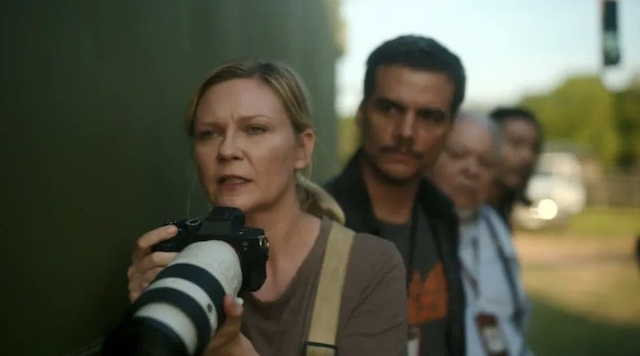
Check out more of Adriano’s articles.
Here’s the trailer of the film.

